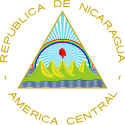 |
|---|
Parliamentary elections were held in Nicaragua in November 1918 for half of the Deputies and a third of the Senators of the National Congress. [1]
 |
|---|
Parliamentary elections were held in Nicaragua in November 1918 for half of the Deputies and a third of the Senators of the National Congress. [1]